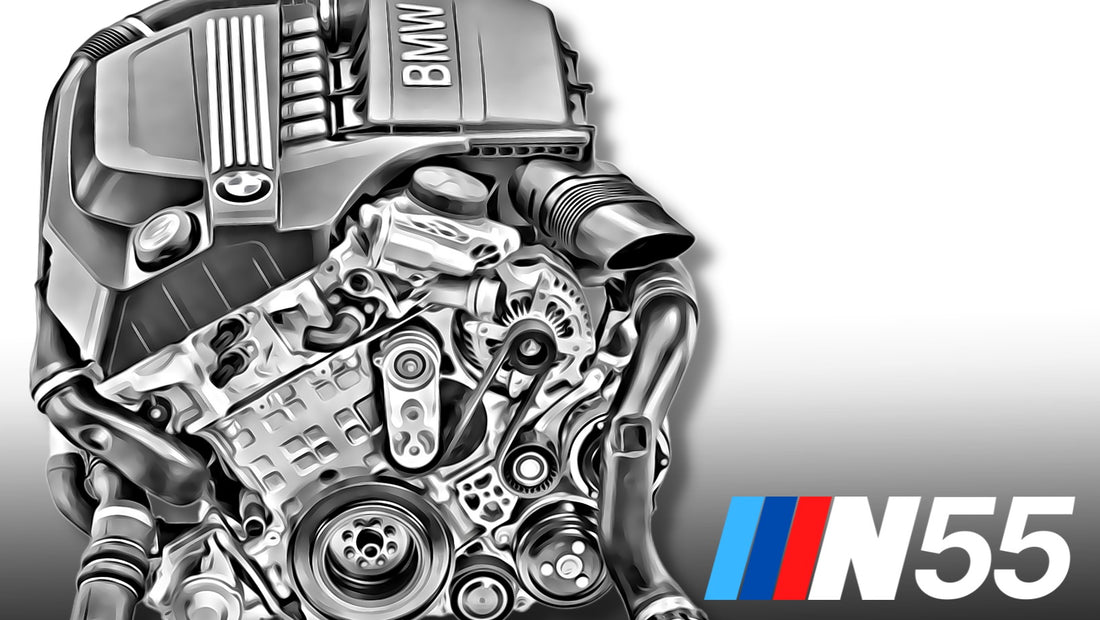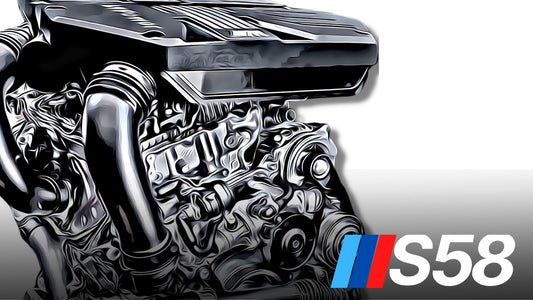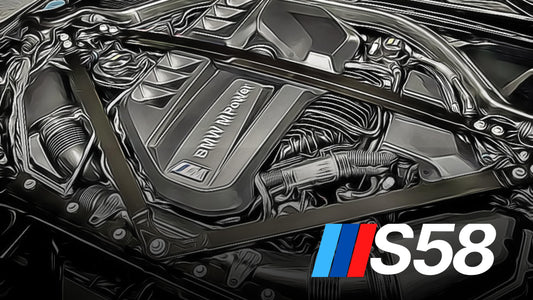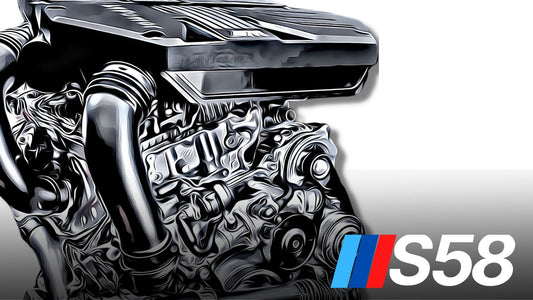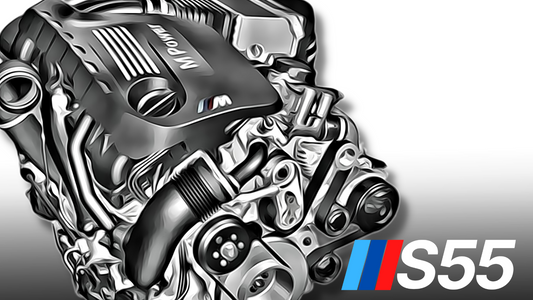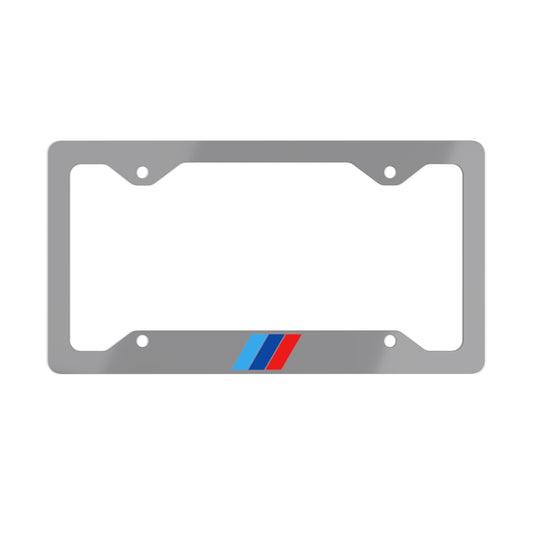BMW's first mass-produced turbocharged engine — and had huge shoes to fill. The N55 included several improvements, the majority of which were designed to make it a more dependable machine than its predecessor - the N54. Read on to discover why this engine is so loved by tuners and other enthusiast.
Introduction
The BMW N55 is a 2009 model with a turbocharged 3.0L inline-six engine. It was launched to replace the successful N54 — BMW's first mass-produced turbocharged engine — and had huge shoes to fill. The N55 included several improvements, the majority of which were designed to make it a more dependable machine than its predecessor. It has been utilized to power numerous vehicles in the German manufacturer's portfolio since its introduction. Here's all you need to know about the BMW N55, which is perhaps BMW's most dependable turbocharged engine:
Similarities And Differences Between The N55 And N54 Engines
The N55 , like the N54, displaced 2,979cc and had diameter and stroke measurements of 84mm and 89.6mm, respectively. The compression ratios were also the same, at 10.2:1. An air-to-air intercooler and an open deck block design with an aluminum block and iron cylinder sleeves are also used in these engines.
Turbochargers: Single vs. Twin
The turbochargers are the most noticeable change between the two engines. While the N54 had dual turbochargers, BMW eliminated one in the N55, which has a single twin-scroll turbo. This isn't always a bad thing.
A twin-scroll turbocharger is a single turbocharger with two "scrolls" in the exhaust housing. The three cylinders that fire in the same sequence feed one scroll, while the other three feed the second scroll. This lowers exhaust reversion, which occurs when exhaust gases enter the combustion chamber, raising the temperature and emitting more pollutants.
This twin-scroll turbocharger design effectively mirrors the N54's twin-turbo setup, giving shorter turbo spool time, more power, and allowing the engine to operate cooler. It is also less expensive to develop and construct, as well as more compact.
Engine Internals
Another important change between the
N54 and N55 was the engine construction. The crankshaft and rods on the
N54 are forged, whilst those on the N55 are cast iron. Simply told, the previous-generation N54 engine is more durable, but the N55 should not cause you any concern unless you want to tweak it to produce more than 600hp at the wheels.
VANOS and Valvetronic
In addition to the 'VANOS' variable valve timing system that was also offered on the N54, the N55 included BMW's 'Valvetronic' variable valve lift system. However, the N55's VANOS provides an extra 15 degrees of adjustability on the intake side and 10 degrees on the exhaust side.
Other differences between the two engines are small: the N54 has a pneumatic actuator, whilst the N55 has an electric one; the fuel injectors are different; and tiny alterations, such as an extra weaving around the N55 cylinder sleeve, have been made to increase cooling.
Different N55 Engine Versions
Since its introduction, the N55 has powered a number of BMW vehicles, several of which are still on the market today. While the engine is the same on all models, it is tweaked differently depending on the application.
N55B30M0
The first N55 engine was the N55B30M0 model. 302hp @ 5,700-5,800rpm and 295lb-ft of torque at 1,200-5,000rpm are the output stats. As you can see, this engine is distinguished by outstanding torque delivery across the rpm range.
This version is used in the 2013-2016 BMW F32/F33/F36 435i, the 2014-2018 BMW F15 X5 xDrive 35i, the 2014-2019 BMW F16 X6 xDrive 35i, and the 2014-2016 BMW F26 X4 xDrive 35i.
N55B30
The N55B30 was introduced in 2011 and powered the BMW F06/F12/F13 640i, 2012-2013 BMW E82/E88 135is, 2012-2015 BMW F20/F21 M135i, and 2012-2015 BMW F01 740i/Li.
The max power numbers for this engine were somewhat greater than those for the N55B30M0: 315hp at 4,505-6,000rpm and 332lb-ft at 1,300-4,500rpm.
N55B3000
Produced between 2013 and 2016 for the BMW F22/F23 M235i and the 2015-2016 BMW F20/F21 M135i LCI. While torque output is the same as the N55B30, power is increased to 322hp between 4,505rpm and 6,000rpm.
N55HP
The N55HP generates the same amount of torque as the N55B30 but greater power, with 335hp available from 4,505rpm to 6,000rpm. This engine was utilized in the BMW F30 ActiveHybrid 3 from 2013 to 2015, as well as the BMW F10 ActiveHybrid 5 from 2011 to 2016.
N55B30T0
The N55B30T0 engine was used in two vehicles: the 2016-2018 BMW F87 M2, which generated 365hp at 6,500rpm and 369lb-ft of torque between 1,450rpm and 4750rpm, and the 2015-2018 BMW F26 X4 M40i, which produced 355hp between 5,255-6,000rpm and 343lb-ft between 1,350-5,250rpm.
Tuning The N55
The fact that the N55 engine was employed in so many automobiles, from sedans to SUVs, with no substantial adjustments is a genuine tribute to its tuning capabilities. Yes, the earlier N54 engine is more responsive and exciting to drive once adjusted, but the N55 isn't a slouch either. The S55 is a high-performance version targeted at the M product line and has many significant performance improvements over the standard N55.
Even earlier versions of the N55 engine may be adjusted to generate roughly 400whp. If you want to get even more power out of the engine, you'll have to replace the factory turbocharger with an aftermarket big-single or twin-turbo configuration.
Common Issues With The N55 Engine
When compared to the N54, the N55 is slightly less robust, although the latter has a more dependable engine. However, it did encounter certain common faults, the majority of which were caused by parts brought over from the N54.
- Valve Cover Oil Leak
- VANOS Solenoid Failure
- Water Pump Failure
- Leaking Oil Filter Housing Gasket
- High Pressure Fuel Pump Failure (HPFP)
Valve Cover Gasket Failure Causing Oil Leaks
A leaky valve cover gasket is a regular problem with the N55 engine. This rubber valve is subjected to high temperatures, which deteriorates it over time. As a result, it may fracture, causing an oil spill.
The valve cover gasket is located beneath the valve cover, which is made of plastic and is likewise vulnerable to high temperatures. The cover should survive for more than 100,000 miles, but because it's difficult to access, you should have it replaced anytime you change the gasket.
Replacement valve covers can be found on eBay Motors & Amazon.
Failure Of The N55 VANOS Solenoid
The VANOS solenoids are active whenever your engine is operating. Understandably, this is a component that will degrade over time. If your engine is not carefully maintained, the solenoids may become oil-coated, causing engine issues. This might cause a severe decrease in performance or perhaps force your vehicle into limp mode.
If you're an enthusiast seeking to get the most out of your engine, the N54 could be the superior option. It was, however, somewhat unreliable and costly to repair. The N55, on the other hand, while not as capable, is still a lot of engine and one that you'll be able to enjoy driving.
Replacement VANOS Solenoids covers can be found on eBay Motors & Amazon.
Electric Water Pump Failure
Unfortunately, a water pump failure is an issue that plagues all BMWs and not just the N55. There are no symptoms of an impending water pump failure unless it’s electrical. If that’s the case, you will be able to check for a drop in coolant flow,
Replacement Water Pumps can be found on eBay Motors & Amazon.
Leaking Oil Filter Housing Gasket
Another flaw with the N55 is the Oil Filter Housing Gasket (OFHG), which degrades and leaks oil over time. An OFHG leak is not a significant problem in the short term, however, not to unnecessarily terrify anyone, the oil frequently seeps onto the belt tensioner and drive belt.
Oil spilling onto belts is never a good thing. This can cause the belt to snap or slip off the pulley, causing damage to other engine parts and, in the worst-case scenario, pulling the belt into the crankshaft seal (front main seal). If the belt makes it past the front main seal and into the engine internals you have a severe problem at hand.
N55 High Pressure Fuel Pump Failure (HPFP)
A high pressure fuel pump is in charge of pumping gasoline from the gas tank into the fuel injectors, where it is sprayed directly into the cylinders via the N55's direct injection. We won't spend too much effort on this because it predominantly affects 2010 and early-to-mid 2011 model N55s. BMW’s N54 is infamous for the multiple HPFP difficulties observed during its manufacturing.
It wasn't until late 2011 that an effective HPFP resolved the problem. You guessed right, despite repeated attempts by BMW to correct the HPFP, in 2010 and 2011 when the N55 was originally unveiled BMW still did not have an official fix.
However, unlike the N54's HPFP, which has a 10-year, 120,000-mile extended guarantee, the N55's HPFP does not have an extended warranty. The bulk of the problematic HPFPs installed in early model N55s most likely failed under warranty and were replaced with the most recent design, which fixed the problems. There may still be some older N55s out there operating on the older HPFP, so this may go wrong.
Replacement high pressure fuel pumps can be found on eBay Motors & Amazon.
N55 Reliability
Despite the belief that BMW engines are unreliable, the BMW N55 is a reasonably dependable engine. The valve cover and gasket, water pump, oil filter housing gasket, and VANOS solenoids are the four most prevalent faults with the N55, in no particular order. None of them are serious concerns, and the majority of the parts are inexpensive. However, and this is where I believe the misunderstandings regarding BMW dependability come into play, if you constantly service your car at the BMW dealership or independent repair shops, the repair fees can start to build up.
Also, bear in mind that this is not an entire list of things that can go wrong with the N55, and just because something is on the list does not indicate it will be an issue indefinitely. Having said that, we're looking at the "average" N55 and what goes wrong with the "average" engine. There are plenty of N55s with 100,000 miles that have not had any out-of-pocket maintenance, yet others with substantially fewer miles may require thousands of dollars in repairs each year. It all boils down to how well you keep your N55 and, to some degree, luck of the draw. Overall, the BMW N55 engine is a dependable unit that can be readily adjusted to produce excellent horsepower and torque.

